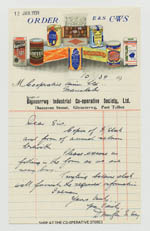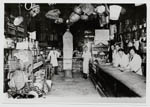|
Trade | The Dividend |
Products | Savings and
Clubs Trade
The ways in which members purchased goods changed over time. As well as cash
purchases and account books recording the purchases of customers some
societies offered alternative methods. For example, some societies issued
pre-paid tokens that could be exchanged at a later date for specific goods
or in place of payment.


Many of the co-operative societies in Wales issued trade tokens.
Examples of tokens issued include tokens for large and small loaves by
Ferndale Co-operative Society and for 5 shillings by Taibach and Port Talbot
Co-operative Society. [SWCC/MND/137/2/28/3 and SWCC/MND/137/2/64/11]
The Dividend
The dividend, or ‘divi’, is perhaps, the most well recognised feature of the
Co-op. The dividend is the amount of money that members would receive from
part of the society’s profits, the amount being proportionate to their
purchases made at the society’s store during a particular period. This was
usually expressed as being so many pence to the pound, such as 1s/6d to the
£. The level of the dividend would depend on the system operated by the
society as well as other economic influences. For example, although many of
the Co-operative Societies were affected by the industrial unrest of the
1920s, in contrast to a dividend of 6d in the £ paid by the Mid-Rhondda
Co-operative Society to its members in the spring of 1922 no dividend was
paid to members of the Ynysybwl Co-operative Society. The ‘divi’ was phased
out in the 1970s, only to be reintroduced in 1998.

The report and balance sheet published by Ynysybwl Co-operative
Society to its members for the six months ending 4 April 1922 gives the
reasons for the committees decision not to pay a dividend to its members for
that period, namely because of the industrial depression.
[SWCC/MND/137/2/73/2]
Products
As co-operative societies developed, the range of products and services they
offered expanded, catering for every need. Whilst in their early days
societies concentrated on everyday requirements, namely unadulterated and
reasonably priced foods, which they offered in competition to shops
connected with particular companies, known as ‘truck’ shops, and private
traders. However the range of products sold quickly branched out. Clothing,
boots and household goods were extended to include furniture and electrical
goods.

The products offered by Co-operative stores were wide-ranging and
included goods made by the Co-operative Wholesale Society as well as other
manufacturers and suppliers. The excellent quality and competitive prices
for everyday household essentials such as tea, biscuits and soap, together
with good service, lead many people, including non-members, to shop at
Co-operative Society stores. [SWCC/MND/137/2/31/1]
The mid-twentieth century saw a change in the way people shopped, and the
Co-operative Societies reflected these developments. The first self-service
store was opened by the London Co-operative Society in 1942, and other
Societies quickly followed suit. There was also a movement away from smaller
stores towards larger department stores and supermarkets, and with it
diversity in trade, with Co-operative Societies developing funeral, finance
and pharmacy businesses. However, the customers trust in the quality and
cost are still key factors, as are the principles behind the Co-operative
Movement, such as ethical banking and Fairtrade products.
Savings and Clubs
Co-operative societies often offered members ways to save in addition to the
periodical payment of the dividend. Clubs focussed around particular seasons
or products, such as Christmas club at Pontycymmer and a chocolate club at
Pembroke Dock, were organised. Penny banks and small savings banks at
individual co-operative societies enabled members to put small amounts of
money aside ready for a rainy day.

Photograph of the interior of Pembroke Dock Co-operative Society
store with a poster about its Chocolate Club. [SWCC/MND/137/2/48/14]

Photograph of co-operative store at Llantwit Fardre, with a
notice encouraging members to join its Christmas Club Christmas clubs were
a popular way of saving for the festivities and many Co-operative Societies
operated them. [SWCC/MND/137/2/39/1]
Suggested further reading:
• Co-operative Financial Services -
http://www.cfs.co.uk
|
|












